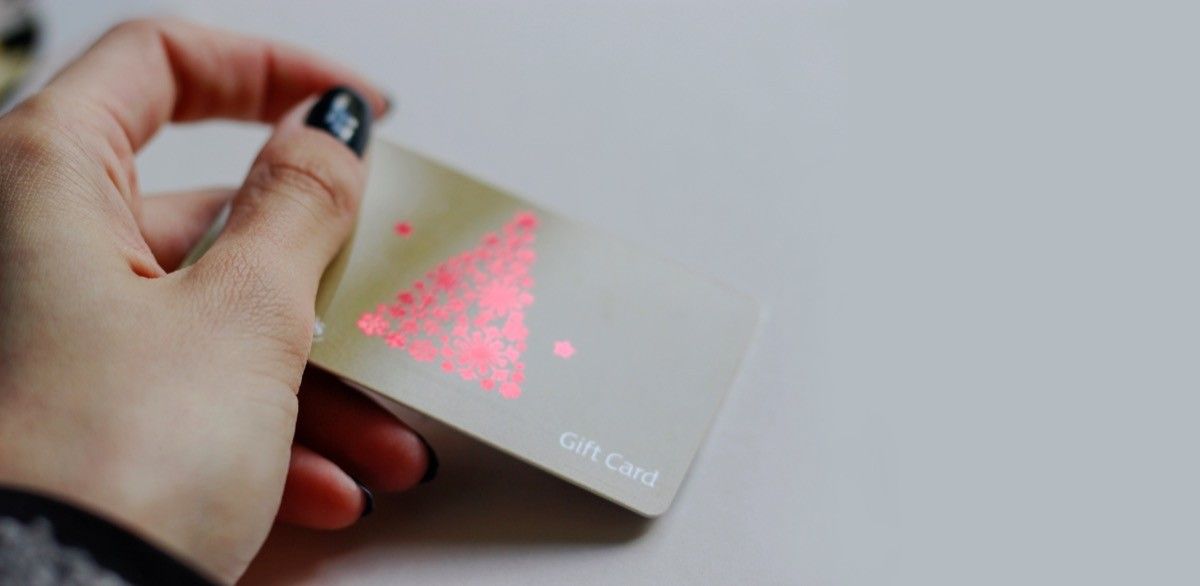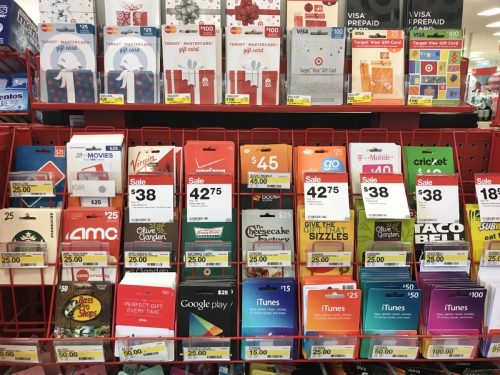Never Buy a Gift Card If You Notice This, Experts Warn
This could be a tell-tale sign that you're getting scammed.

As Christmas draws near, many shoppers are running around trying to secure last-minute presents. Gift cards are a particularly popular purchase as time dwindles down or simply for those who are hardest to shop for, as they don't involve much planning ahead. In fact, 66 percent of shoppers said they expect to buy at least one as a gift during the 2021 holiday season, according to an October AARP survey of more than 1,000 U.S. adults. But these seemingly no-fuss gifts don't come without their own problems. The Federal Trade Commission (FTC) reported in early December that gift card scams are on the rise this year, with around 40,000 consumers reporting having lost $148 million during the first nine months of 2021. To help protect you from these scams, experts say you should watch out for one thing when you buy a gift card. Read on to find out what is a tell-tale sign you should not be purchasing one of these cards.
RELATED: Never Use This One Card to Pay for Holiday Gifts, FBI Says.
Scammers can take money from your purchased gift cards without even being near you.

Around 21 percent of consumers reported that they have given or received a gift card with no money on it, according to the October AARP survey. "While this could be the result of a cashier error, it could also reflect the ease at which gift cards on store racks can be manipulated," AARP said in its report. "Consumer Reports noted in December 2019 that scammers have been tampering with gift cards on racks for years."
Kathy Stokes, director of fraud protection for the AARP, told the StarTribune that thieves have been able to create sophisticated scam rings that allow them to wipe a gift card with ease. According to Stokes, scammers can gain access to the cash that a shopper has put on it just shortly after the card has been purchased and activated without even coming in contact with that shopper.
"As soon as that card hits the cash register, they're pinged," Stokes warned, noting that the value of the card can end up being drained by a scammer without ever leaving your hands.
Never buy a gift card that has damaged packaging.

According to Kathy, scammers will tamper with gift cards at the store by removing their security tape and taking a photo or writing down a card's hidden 16-digit activation code. And they're often able to get away with this by placing new security tape back onto the cards, so it looks like it hasn't been removed at all. But a sure sign that a gift card could have been tampered with is that the card's packaging has been damaged.
"Look for any signs of tampering if you're buying a gift card or receiving one. Is the packaging damaged? Is that pin number scratched off? These can be red flags," Ted Rossman, an industry analysts with CreditCards.com, recently explained to Fox Business. If you notice these signs, notify the retailer and pick out a different gift card.
RELATED: For more retail news, sign up for our daily newsletter.
This is not the only way scammers will utilize gift cards.

This is just one way that individuals will use gift cards to scam unsuspecting shoppers, however. According to the FTC, scammers will also try to call people and demand that they pay them with gift cards. The thieves often pose as government officials, tech support employees for Apple or Microsoft, dating website matches, friends, or even family members in order to convince you to pay them with gift cards.
Scammers will call, say that the payment is needed urgently, tell you which gift card to buy, and ask you for the gift card number and pin. Once they get this, they can immediately take the money you loaded onto the card. And this is more common than you might think: According to the FTC, one in four people who reported losing money to fraud say that a scammer tricked them into giving them the numbers on the back of a gift card, per the StarTribune.
"Gift cards are for gifts, not for payments. But they're popular with scammers because they're easy for people to find and buy, and they have fewer protections for buyers compared to some other payment options," the FTC warned. "They're more like cash: once you use the card, the money on it is gone. Scammers like this."
Some retailers are more likely to be targeted by gift card scams.

According to the FTC, thieves have utilized a number of retailers in these gift card scams, including Walmart, Best Buy, CVS, and Walgreens. But one of the most targeted retailers for scammers of this kind is Target. In the first nine months of 2021, people who reported losing money to gift card scams mentioned Target stores more than any other retailer, the organization reported.
"Target gift cards accounted for about $35 million in payments to scammers, more than twice as much as any other brand of gift cards," the FTC said. The organization reported that Target cards saw a median reported loss of $2,500 in the first nine months of the year—far higher than any other retailer—and about 30 percent of those scammed with a gift card from there said they had lost $5,000 or more.
In a statement to the StarTribune, Target said it has increased in-store signage to warn shoppers of common gift card scams and educate employees to keep an "eye out for potentially distressed guests buying gift cards and intervene as needed."
The retailer added, "We also continue to implement new technology to prevent gift cards from being abused by fraudsters."
RELATED: If You Get This Message from Your Bank, Contact Authorities, FBI Says.





















